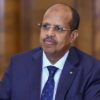Kathmandu November 19- A crude bomb exploded early on election day in Nepal on Tuesday, injuring three children as voters turned out for a poll seen as crucial in stabilizing the Himalayan country after a civil war.
The explosive planted in a middle class residential neighborhood in the capital Kathmandu went off three hours after polling stations opened, with another five hoax bombs recovered by police on Monday.
“I was passing by when I saw three children lying on the ground, crying for help,” 28 year old eyewitness Saroj Maharjan told AFP at the scene, where voters said they were now terrified.
“One of the children, whose face was covered in blood, fainted in my arms as I carried him to a nearby hospital,” he added.
Police said an eight year old had picked up the bomb shortly before it detonated, assuming it to be a toy.
A splinter faction of the Maoist party has vowed to disrupt the poll, undermining the objective of producing a constituent assembly of national unity which must write a new constitution.
A first assembly elected in 2008, two years after the end of fighting by the Maoists, was dominated by the former rebels but was riven by divisions and highly unstable.
Five prime ministers served brief terms, for long periods the country had no leader, and the 601 member body collapsed in 2012 after failing to agree on a new constitution.
The Maoists led by Pushpa Kamal Dahal, known better by his nom de guerre Prachanda, are expected to be the biggest losers with many supporters disillusioned by their leadership.
Prachanda, who launched a “People’s War” in 1996 inspired by China’s Cultural Revolution, voted in the southern district of Chitwan wearing a shirt and Western style black suit.
Organising the election has been a logistical headache in a country home to eight of the world’s 14 highest mountains, requiring helicopters, horses and porters to deliver ballot boxes to remote areas.
“Some of the voters have trekked for five hours to reach here. They include elderly as well as young first time voters,” Gitachari Acharya, an official at the nearest polling station to Mount Everest, told AFP.
Centenarian Lal Bahadur Rai was the first man to vote at a polling station in northeastern Sankhuwasabha District.
“My vote is for the future of youngsters and the new generations,” the 101 year old told AFP in a phone interview after casting his ballot.
The political deadlock has had a severe impact on the economy, with annual GDP growth tumbling from 6.1 percent in 2008 to 4.6 percent last year, World Bank figures show.
With 39 percent of the country aged between 16 and 40, according to government data, jobs are a major issue for young first time voters like Urmila Maharjan.
The 22 year old student told AFP she hoped “the new assembly will address issues like unemployment”.
Hopes of reconciliation between the country’s politicians were dashed by the decision of a 33 party alliance, led by the Communist Party of Nepal Maoist (CPN M), to disrupt the polls and intimidate voters.
In recent days they have torched vehicles and hurled explosives at traffic to protest the fact that the vote is being held under an interim administration headed by the chief justice of the Supreme Court.
They wanted a cross party government in place which would include them.
One person has been killed and more than 360 arrested, police say.
Security had been tightened across the country as a result, with the government deploying 50,000 soldiers and 140,000 police to guard polling stations.
Measures include a ban on all public and most private transport, meaning that nearly all voters had to walk to polling stations to cast their ballot.
More than 100 parties, including three major ones the Unified Marxist Leninist, the Nepali Congress and the Maoists are fielding candidates for the constituent assembly, which will also serve as a parliament.















































